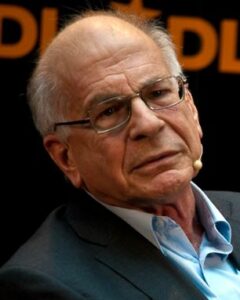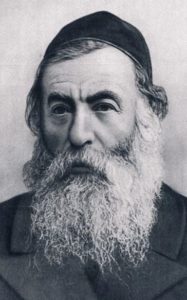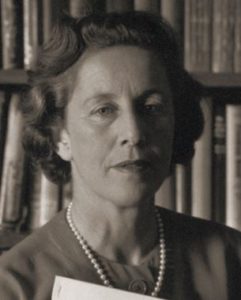In Memory of a Nobel Prize-Winning Researcher
 Daniel Kahneman (1934-2024) was born in Tel-Aviv to Lithuanian Jews who made aliyah from France. His uncle, Rabbi Yosef Shlomo Kahaneman, was the head of the famed Ponevezh Yeshiva. Kahneman spent much of his youth in Paris—including during the Holocaust years under the Vichy regime—before returning to Israel in 1948. He studied psychology and mathematics at Jerusalem’s Hebrew University, and later became a psychologist for the IDF, where he developed the standard recruitment interview. Kahneman then moved to the United States to study at UC Berkeley, and earned a Ph.D in psychology in 1961. He returned to Jerusalem to teach at Hebrew University, and was also a visiting professor at the University of Michigan and at Harvard. He researched a variety of fascinating subjects in cognitive psychology, including attention, judgement, memory, biases, happiness, and decision-making. His key conclusion was that people are actually not rational decision-makers, and tend to make counterproductive choices based on biases and preconceived notions. His classic 1998 paper on the “focusing illusion” demonstrates how people tend to overestimate a single factor when predicting happiness. For instance, although studies showed that people across America had relatively the same levels of happiness, people would believe Californians are happier because they overestimated the effects of nice weather. Kahneman is perhaps most famous for his work in integrating psychology with economics, or “behavioural economics”, earning him the 2002 Nobel Prize in Economics. Over the course of his career, Kahneman also taught at Princeton, UC Berkeley, and the University of British Columbia. He wrote several bestselling books and was awarded numerous prizes and honorary degrees. Sadly, Kahneman passed away last week. He has been hailed as one of the most important thinkers of the 20th century.
Daniel Kahneman (1934-2024) was born in Tel-Aviv to Lithuanian Jews who made aliyah from France. His uncle, Rabbi Yosef Shlomo Kahaneman, was the head of the famed Ponevezh Yeshiva. Kahneman spent much of his youth in Paris—including during the Holocaust years under the Vichy regime—before returning to Israel in 1948. He studied psychology and mathematics at Jerusalem’s Hebrew University, and later became a psychologist for the IDF, where he developed the standard recruitment interview. Kahneman then moved to the United States to study at UC Berkeley, and earned a Ph.D in psychology in 1961. He returned to Jerusalem to teach at Hebrew University, and was also a visiting professor at the University of Michigan and at Harvard. He researched a variety of fascinating subjects in cognitive psychology, including attention, judgement, memory, biases, happiness, and decision-making. His key conclusion was that people are actually not rational decision-makers, and tend to make counterproductive choices based on biases and preconceived notions. His classic 1998 paper on the “focusing illusion” demonstrates how people tend to overestimate a single factor when predicting happiness. For instance, although studies showed that people across America had relatively the same levels of happiness, people would believe Californians are happier because they overestimated the effects of nice weather. Kahneman is perhaps most famous for his work in integrating psychology with economics, or “behavioural economics”, earning him the 2002 Nobel Prize in Economics. Over the course of his career, Kahneman also taught at Princeton, UC Berkeley, and the University of British Columbia. He wrote several bestselling books and was awarded numerous prizes and honorary degrees. Sadly, Kahneman passed away last week. He has been hailed as one of the most important thinkers of the 20th century.
Words of the Week
Nothing in life is to be feared, it is only to be understood. Now is the time to understand more, so that we may fear less.
– Marie Curie
From the Archives: In Memory of Joe Liberman

 Yitzchak Yaacov Reines (1839-1915) was born near what is now Pinsk, Belarus to a long line of rabbis. He studied at the famous Volozhin Yeshiva where he received his rabbinic ordination in 1867. Rabbi Reines became the rabbi of the town of Svintsyan, Lithuania, just north of Vilnius. There, he opened his own yeshiva which, for the first time, included a secular studies curriculum as well. In 1882, a large assembly of rabbis gathered in St. Petersburg to discuss easing the plight of Russian Jewry, then suffering immense persecution and poverty. Reines proposed spreading his successful yeshiva model across Russia, allowing Jews to integrate into mainstream society (and economy) without abandoning their faith and traditions. The assembly rejected his plan, so Reines continued his mission on his own. His Svintsyan Yeshiva created a ten-year program that would give students both rabbinic ordination and a government-approved job. Unfortunately, the yeshiva faced too much opposition and shut down after four years. Meanwhile, Rabbi Reines was an active member of Hovevei Zion. In 1893, together with Rabbi Shmuel Mohilever, he proposed that Jews settle in their ancestral Holy Land and organize a mercaz ruhani, “spiritual centre”, that would combine Torah with good-old-fashioned agricultural labour. In 1899, Reines participated in the Third Zionist Congress, following which he kept a regular correspondence with
Yitzchak Yaacov Reines (1839-1915) was born near what is now Pinsk, Belarus to a long line of rabbis. He studied at the famous Volozhin Yeshiva where he received his rabbinic ordination in 1867. Rabbi Reines became the rabbi of the town of Svintsyan, Lithuania, just north of Vilnius. There, he opened his own yeshiva which, for the first time, included a secular studies curriculum as well. In 1882, a large assembly of rabbis gathered in St. Petersburg to discuss easing the plight of Russian Jewry, then suffering immense persecution and poverty. Reines proposed spreading his successful yeshiva model across Russia, allowing Jews to integrate into mainstream society (and economy) without abandoning their faith and traditions. The assembly rejected his plan, so Reines continued his mission on his own. His Svintsyan Yeshiva created a ten-year program that would give students both rabbinic ordination and a government-approved job. Unfortunately, the yeshiva faced too much opposition and shut down after four years. Meanwhile, Rabbi Reines was an active member of Hovevei Zion. In 1893, together with Rabbi Shmuel Mohilever, he proposed that Jews settle in their ancestral Holy Land and organize a mercaz ruhani, “spiritual centre”, that would combine Torah with good-old-fashioned agricultural labour. In 1899, Reines participated in the Third Zionist Congress, following which he kept a regular correspondence with 